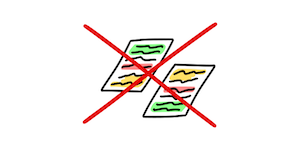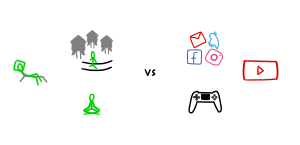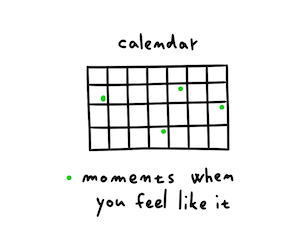9 Digital Health Rules

The Internet is an amazing tool.
But I’ve been using it the wrong way - it became my new default, my master and I think I’m not the only one.
Always connected.
Always available.
Always staring at screens.
Always being able to look up everything on demand.
Always busy, but not being able to think.
Never bored.
It ruined my attention span.
I wasted so much time and I didn’t even enjoy it.
That’s okay, we didn’t know what the Internet would do to our brains, it was a new and wonderful thing.
With much of our work being done on our computers, we lost sight of the boundary between work and fun.
And now during the pandemic, the boundary became even more blurred when we had to stay home and we couldn’t go to offices, schools, libraries, or coffee shops to do our work.
Is there a way out of this?
Leaving the Internet altogether isn’t possible. But continuing using it compulsively and without boundaries isn’t good either. I don’t want to waste my time on the Internet while real life slips by.
I want to use the Internet as the most important tool ever invented once again.
So the question is:
Is it possible to go from being online by default to being offline by default? Is it possible to use the Internet as a useful tool instead of being enslaved by it?
It definitely is!
If you feel you can’t control yourself, read this, and try to stop the compulsive use first.
While you’re working on the challenge or you think you just want to create healthier boundaries, start incorporating the following rules into your life. They will ensure you keep a healthy relationship with the Internet.
6 Rules to use the Internet in a healthy way
1. Use the Internet purposefully
Before you open your laptop or pick up your phone, come up with a reason to do so. Have an answer to: What am I looking for?
Don’t just look for a dopamine hit to distract yourself from your life.
If you just browse, without purpose, you’ll be busy doing meaningless work, or find a way to simply kill time (news, entertainment).
2. Search, don’t browse
Content aggregators like Youtube, Reddit, Instagram, Twitter send us into a passive mode of consumption.
One way to use the Internet more intentionally is to access content via search.
Your curiosity should carry you.
Pro tip: Turn your Social Media into a search bar without a feed. You can still take advantage of the best parts of Social Media(for example Youtube’s how-to videos, long-form videos) without the potential downsides of getting into rabbit holes. Use these browser extensions: DistractionFree Youtube, News Feed Eradicator (for Facebook, Twitter, Reddit).
3. Search, but not immediately
Don’t look up things immediately, write them down first.
Especially when you’re working and have a question, an idea, a thought, an errand you’re supposed to do - don’t jump straight to doing it. Instead, have a paper nearby and write it down. Process it later. Google all the stuff you wanted to as a reward at the end of your day/work session. It will help you stay on task and be more satisfying.
4. Limit your time using content aggregators
Sometimes you need to be informed.
Sometimes you need to stay up to date.
Sometimes you need to get inspired.
Sometimes, not every single minute.
Set rules for content aggregators beforehand and use them infrequently:
Once a day in the evening for a few minutes.
Once a week during the weekend for 30 minutes.
It’s also better to not have access to them on your phone because then it becomes much easier to check them compulsively.
5. Whenever you do any kind of deep work, turn off distractions
The basic rule for your phone is to keep it out of sight, out of reach, (out of hearing).
For your computer, restrict how you use it during the day.
6. When outside, treat your phone like it’s a book
You wouldn’t open a book during a conversation.
You wouldn’t be reading a book while driving.
This is a great rule of thumb for using your phone outside that I stumbled upon here.
3 General habits to support digital health
7. Enjoy input-free time
Don’t be distracted all the time, learn to get bored once in a while, and enjoy being with your thoughts.
We have to process so much information each day. We keep adding more and more because we try to be busy, and it becomes mindless consumption that creates a huge overload. All of the information gets mixed together and we don’t benefit from 99% of it.
When we slow down, we give ourselves time to process it and contemplate, then we can apply the information in our lives.
The simplest and best practice is to sit down for a few minutes and just dream about the day. Let the mind wander.
There are so many places where you can practice this:
When you wait in line, don’t pick up your phone.
When you’re cooking or cleaning up, don’t listen to anything.
Commuting? Enjoy the ride. Look out of the window.
PRO TIP EXERCISE from Reddit:
Every time I would mindlessly reach into my pocket to grab the phone, I would then instead open the notes app and note down the time when I felt the urge and where I was/what I was doing, then put the phone back.
Day one: 5 urges. Day two: 3 urges. All other days: Only one urge right after wakeup (that one is the hardest).
8. Spend more time outside
When you’re outside, you’re already less likely to be glued to your screen, especially if you follow the advice of treating your phone like a book.
Try to appreciate how nice it is being outside.
Practice:
Go for a walk - going for a walk is much more positive than mindlessly consuming random Internet content.
9. Plan some high-quality leisure activities
Have a conversation with a friend over a coffee, plan a cycling trip, or do other things in real life that take you away from screens.
When you do this, you’ll see how pointless it is to waste time surfing.
The same time you'd spend lying immobile, watching and scrolling, can transform into interesting experiences and fun memories with just a bit of effort.
Summary
So here are the rules to keep your mind sane while using the Internet:
- Use the Internet purposefully
- Search, don’t browse
- Search, but not immediately
- Limit your time using content aggregators
- Whenever you do any kind of deep work, turn off distractions
- When outside, treat your phone like it’s a book
- Enjoy input-free time
- Spend more time outside
- Plan some high-quality leisure activities
Use these rules, and the Internet will be a valuable tool at your disposal when you need it, and not your master. Here’s what that looks like in practice.


